

Web searching. Uw-madison writing center writer's handbook. News-Values. For more than a century and a half, men and women of The Associated Press have had the privilege of bringing truth to the world.
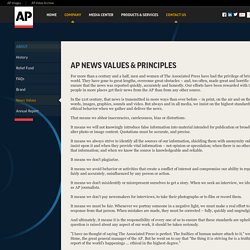
They have gone to great lengths, overcome great obstacles – and, too often, made great and horrific sacrifices – to ensure that the news was reported quickly, accurately and honestly. Our efforts have been rewarded with trust: More people in more places get their news from the AP than from any other source.
In the 21st century, that news is transmitted in more ways than ever before – in print, on the air and on the Web, with words, images, graphics, sounds and video. But always and in all media, we insist on the highest standards of integrity and ethical behavior when we gather and deliver the news. Choosing Credible Sources. When a writer uses a book or published article as a source in a research paper, there are not many questions to ask about the credibility of that source.
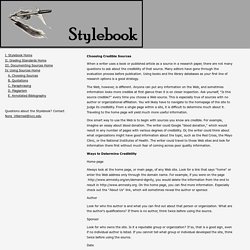
Many editors have gone through the evaluation process before publication. Using books and the library databases as your first line of research options is a good strategy. The Web, however, is different. Anyone can put any information on the Web, and sometimes information looks more credible at first glance than it is on closer inspection. Ask yourself, "Is this source credible? " One smart way to use the Web is to begin with sources you know are credible.
Ways to Determine Credibility. Useful Web Sites. Www.fas.harvard.edu/~wricntr/documents/Transitions.html. Www.fas.harvard.edu/~wricntr/documents/Thesis.html. Www.pbs.org/now/classroom/acrobat/lesson07.pdf. Research Overview. Summary: We live in an age overflowing with sources of information.
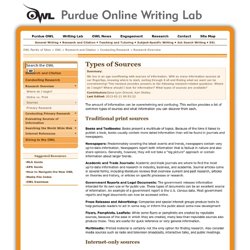
With so many information sources at our fingertips, knowing where to start, sorting through it all and finding what we want can be overwhelming! This handout provides answers to the following research-related questions: Where do I begin? Where should I look for information? What types of sources are available? Contributors: Dana Lynn Driscoll, Karl Stolley Last Edited: 2013-02-21 09:53:22 The amount of information can be overwhelming and confusing. Traditional print sources Books and Textbooks: Books present a multitude of topics. How to Evaluate the Credibility of a Source (with Cheat Sheet)
Edit Article Source Evaluation HelpEvaluating the Credibility of Sources Edited by Sbenjamin, Sondra C, Krystle, Luv_sarah and 41 others We are constantly surrounded by information, and it is not always easy to know which sources to trust.
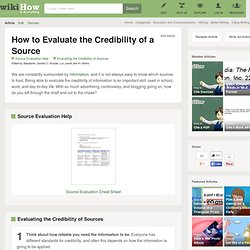
Being able to evaluate the credibility of information is an important skill used in school, work, and day-to-day life. With so much advertising, controversy, and blogging going on, how do you sift through the chaff and cut to the chase? Ad Steps Evaluating the Credibility of Sources 1Think about how reliable you need the information to be. 4Check the date. Tips If a source does not pass the above guidelines, it does not mean that the information contained within is false. Warnings Beware of using Wikipedia as a source for academic or journalistic writing. Library.lakelandcc.edu/PDFs/research/evaluatingsources.pdf.
A Virtual Library of Useful URLs - Subject Headings Arranged by Dewey. We are in the process of updating all the resources in the virtual library The library will remain closed until we have updated all the links.
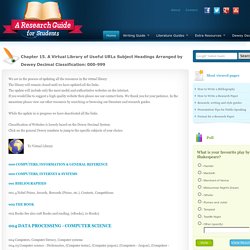
The update will include only the most useful and authoritative websites on the internet. If you would like to suggest a high quality website then please use our contact form. We thank you for your patience. In the meantime please view our other resources by searching or browsing our literature and research guides. While the update in is progress we have deactivated all the links. Classification of Websites is loosely based on the Dewey Decimal System. To Virtual Library. 100 Search Engines For Academic Research. Back in 2010, we shared with you 100 awesome search engines and research resources in our post: 100 Time-Saving Search Engines for Serious Scholars.
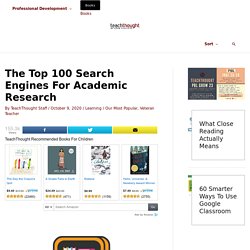
It’s been an incredible resource, but now, it’s time for an update. Some services have moved on, others have been created, and we’ve found some new discoveries, too. Many of our original 100 are still going strong, but we’ve updated where necessary and added some of our new favorites, too. Check out our new, up-to-date collection to discover the very best search engine for finding the academic results you’re looking for.
General Need to get started with a more broad search? Scholarly articles & academic research — finding journal articles: WebLens search portal. Custom Search Narrow your Google search to US colleges & universites by adding site:edu to your query term.
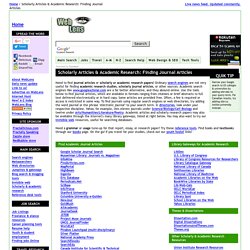
A+ Research & Writing. Skills for Online Searching - ipl2 A+ Research & Writing. Learn how search syntax works Search syntax is a set of rules describing how users can query the database being searched.
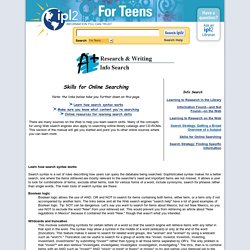
Sophisticated syntax makes for a better search, one where the items retrieved are mostly relevant to the searcher's need and important items are not missed. It allows a user to look for combinations of terms, exclude other terms, look for various forms of a word, include synonyms, search for phrases rather than single words. The main tools of search syntax are these: Boolean logic.